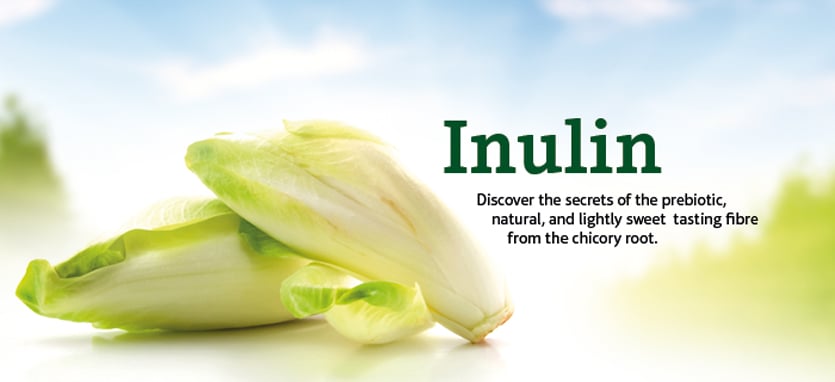
Inulin:
Inulin - dietary fibre for your digestion
Inulin is a type of starch that is widespread in the plant kingdom. Jerusalem artichoke (also known as sunchoke or earth apple), chicory, artichokes, asparagus and black salsifies are rich in inulin. Starch is made up of a long chain of sugar molecules, which can consist of up to 100 individual components. Inulin is a so-called polysaccharide. For food manufacturing, inulin is mainly derived from chicory root. Chicory is known to many as a tasty type of lettuce.
Although the spelling only differs by one letter, inulin should not be confused with insulin. While insulin has a direct effect on the blood sugar level, the consumption of inulin has no effect on it.
In terms of nutrition, sweet-tasting inulin belongs to the prebiotic, water-soluble dietary fibres. Prebiotic dietary fibres are consumed with food but cannot be broken down in the human body’s small intestine. The prebiotics make their way undigested into the lower sections of the intestine and are a source of nourishment for the natural intestinal bifidobacteria. The growth of less desirable bacteria and yeasts are thereby hampered. When metabolising inulin, short chain fatty acids and lactic acid are formed that lower the pH in the colon. Through this slight shift in pH, the solubility of calcium is also increased and improved absorption via the colonic mucosa is promoted. Through a swelling effect, the stool volume of the intestine is increased and the feeling of satiety sets in quicker. The metabolism of inulin has a positive effect on intestinal flora’s composition, and healthy intestinal flora strengthens the immune system and promotes digestion.
In addition to inulin’s many positive qualities, there is, however, one small side effect: excessive consumption of this dietary fibre can stimulate bowel movements more than desired. It may result in bloating and diarrhoea. The recommended intake for adults is 5 g daily.
In the food industry, inulin is used for its properties in spreads, baked goods, dairy products and salad dressings. Thanks to its high swelling ability, inulin bonds with water and can be used as a thickening agent. The slightly sweet flavour helps to reduce the need for other sweeteners. The taste of inulin is creamy and smooth and is therefore often used in low-fat dairy products.
As a GEFRO customer, you will in future find inulin in the ingredients lists of many products. GEFRO aims to offer only gluten free products in the future, and will therefore replace whole-grain flour with gluten free rice flour and the nutritionally valuable fibre inulin.
This product can be found in the following GEFRO products:
GEFRO Dark Gravy with Mushrooms
GEFRO Balance Vegetable Bouillon KITCHEN GARDEN
GEFRO Balance Tomato Sauce and Soup DOLCE VITA
GEFRO Balance Soup-er Snack VEGGIE LOVE
GEFRO Balance Soup-er Snack TOTALLY TOMATO
GEFRO Balance Soup-er Snack TASTE OF ASIA
GEFRO Balance Soup-er Snack EL GAZPACHO
GEFRO Balance Soup-er Snack PEA-LICIOUS
GEFRO Balance Soup-er Snack MUSHROOM MANIA
GEFRO Balance Soup-er Snack BEETROOT KISS




